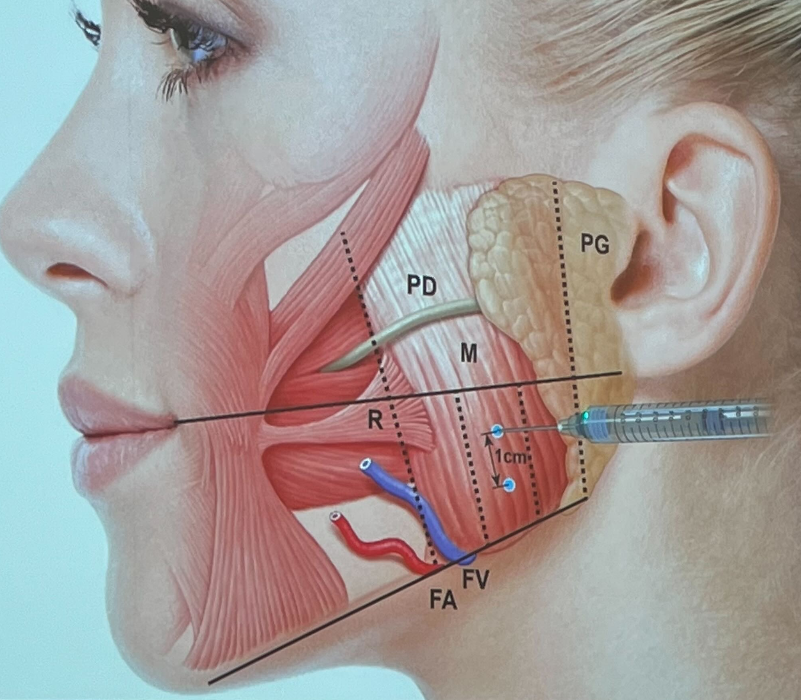
Bruxism and jaw pain
 Bruxism
Bruxism
Bruxism is the involuntary grinding of teeth during sleep. It can lead to broken and worn down teeth. Bruxism can also lead to pain in the jaw muscles and tension headaches. Over time, damage to the jaw joint can also occur
The problems of bruxism can be addressed in 2 ways:
1. Botulinum toxin injections of the jaw muscles active during bruxing
Botulinum toxin (botox®) paralyses the muscle fibres, making the muscles unable or less able to contract when activated. In this case, the intensity of the bruxism can be reduced. Over time, the muscles can reduce in size due to being less used and that in itself can reduce the intensity of the bruxism.
The injections are usually placed in the 2 main muscles of mastication, the masseter and temporalis, on each side of the face. An initial injection is made and the patient is reviewed after 2 weeks to check if there has been reduced muscle activity. If necessary, a top-up injection at 2 weeks is needed.
The effect of the injections lasts about 6 months.
\
2. Provision of a splint for night-time wear
A splint is like a mouthguard to be worn during sleep, since most of the involuntary bruxing happens then.
A splint is like a mouthguard worn during sleep. Depending on the design of the splint, it can help reduce the muscle activity involved in bruxism. A splint also prevents the damage done to teeth and fillings as a result of bruxing.
The splint must be custom-made for a snug fit. Standard splints must be made of a hard acrylic material which is durable enough to withstand the grinding and biting forces.
Depending on the case, a combination of botulinum injections and wearing of a splint could both be necessary to address the issues caused by bruxism.
Furthermore, any bruxing associated damage to the teeth and/ or jaw joint will need to be assessed and treated.
Jaw pain
Jaw pain is a complex issue that can be caused by either:
Pain in the jaw muscles due to hyperactivity
Pain in the jaw joint itself (the temporomandibular join or TMJ).
A combination or both muscle pain and TMJ dysfunction
The cause of jaw pain (and associated headaches) has to be carefully assessed by the dentist to determine the appropriate course of treatment.
Jaw pain can sometimes be accompanied by clicking noises, grating noises, jaw locking and limited mouth opening. These can indicate damage within the jaw joint itself, such as disk slippage, thinning or perforation. Damage within the jaw joint is difficult fo fix. However, measures can be taken to prevent worsening of the joint condition and associated symptoms.
Special imaging such as an MRI scan might be required to confirm what kind of damage is present within the TMJ and from there a treatment can be recommended.
Damage to the jaw joint can be associated with bruxism and measures to reduce the bruxism, such as botulinum toxin injections, can help prevent progression of the TMJ deterioration.
Specifically designed splints can also help reduce TMJ damage as well as assist with concurrent bruxism.
If you have a bruxing problem or jaw pain, contact us at the Melbourne Smile Clinic in Northcote to discuss what is the best treatment for you.
Frequently Asked Questions
Our Team
-

Dr. Christine Yew BDS (U. of Melbourne), BSc (McGill U.)
School/Training
Dr Yew has over 20 years of experience in dentistry, graduating with Honours from the University of Melbourne in 2001.
Dr Yew is registered with AHPRA (the Australian Health Professional Regulation Agency: registration no. DEN0001023296) and is a member of the ADA (Australian Dental Association).
Dr Yew has been involved in the ADA mentoring programme where she volunteers her time to offer advice and guidance to recently graduated dentists. Currently, she is a clinical supervisor for 3rd year dental students at the University of Melbourne and is also a member of the ...
Read More


